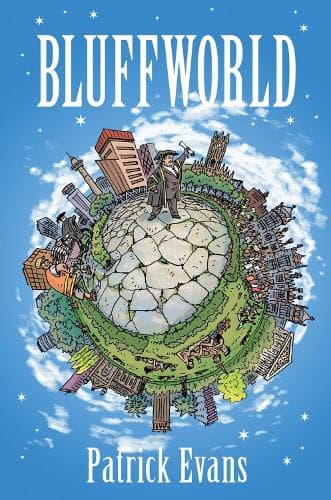Review: Bluffworld
Reviewed by David Hill
Some four decades back, I was sent a novel to review called Being Eaten Alive, written by someone called Patrick Evans. I enjoyed it. Be honest: I enjoyed it more than I expected to. In the early 1980s, you still opened a New Zealand novel apprehensive that it might be embarrassingly amateur or pretentious. But this one was pacy, witty, perceptive. Patrick Evans knew how to build a plot, sustain a mood, evoke a character. I gave Being Eaten Alive a deservedly favourable review and waited with anticipation for the guy's next title.
I waited a long time. It wasn't till over a quarter-century later that Evans' second work of fiction appeared. (In the interim, he'd been building a significant academic career as a lecturer on NZ lit, especially Janet Frame.) Finally, he published Making It, followed in brisk succession by the impressive trilogy, Gifted, The Back of His Head and Salt Picnic. The said guy was back and he'd been worth waiting for.
Now we've got Bluffworld, with its Chris Slane cover niftily evoking Terry Pratchett. It's a riff on the University Novel but a riff with a diff. Our anti-hero is Thomas Flannery, poseur and pretender. He's a splendid artefact: a self-server with enough wistfulness and glints of principle or idealism to keep you feeling sympathetic as he fakes his way through the lectures, publications and the politics of a university career.
At the start, our doubtful Thomas is bewildered, broke and balding, reduced to posing for tourist photos in borrowed academic gowns. He's risen to mediocrity via bluff and toadyism, plagiarising his way to an MA and a series of lectureships. Has he actually read any of the literature he expounds on? Well, his lectures do all focus on opening chapters, pages, even first paragraphs as paradigms of what follow. But eventually he's “run out of luck and bullshit,” house-sitting for more successful colleagues on sabbatical, tapping out his narrative in a staffroom toilet as he tries to comprehend what's happened.
Flannery could almost be a tragic figure, except you're never sure whether he's actually learned anything. We see the bleaker facets of his life: his department supplanted by a trendier faculty with iPhones, smartwatches and elevator conferences (he sneaks in to bite their chairs); his failed relationship with Sally, who heads north for life and purpose, leaving him to Lara the needy Hungarian.
But mostly, Evans has tremendous fun with him. Academic nonsense is deftly disembowelled: ludicrous research topics – “The Meaning of 'The Meaning of Meaning'”; incomprehensible conferences; pretentious jargon, “almost an art form in itself”; colleagues and students of various species and sub-species.
The plot pelts along towards a finale of riot, revenge and shapeshifting. It's a novel which assumes a competence in literacy and literature among its readers: how satisfying. It's also the only one you'll read this decade which comes with 250-plus footnotes referencing Umberto Eco, Samuel Beckett, The Great Gatsby and The Wizard of Oz. They're almost as entertaining as the central story and they emphasise what a spectacularly unreliable narrator Flannery is.
Satire and subversion are ballasted by more sombre issues. How can we verify truth and the integrity of ideas in a Fake News age? What are universities for, and what role can the Humanities still play? Mostly, though, the plot is a torrent of dark comedy, gymnastic dialogue, wordplay, allusion and quotation. Do read it closely; it's crammed with rewarding detail.
It could be nice to have a sympathetic character or two, and a few more variations of mood. The slapstick sometimes inflates to excess. A prof who lectures in academic gown and chest-high waders? A whiskey called Tennessee Tiger Water, with a label showing the beast peeing into the bottle? Hmmm....
But it's a novel glittering with energy, wit, mischief, an intellectual and narrative romp. Do keep going, young Pat.
Reviewed by David Hill
